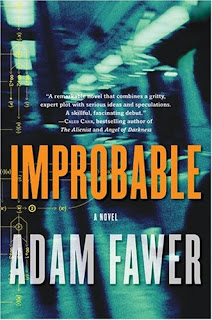 Nice expression; improbable, which means not impossible but very unlikely to occur or happen. This is the name of the novel of Adam Fawer. It was different than I expected but in some terms, even better than I expected also. The book became more meaningful to me while I have been teaching statistics and probability course since 3 semesters in the university. Because the book is actually about the life of a lecturer of statistics and probability. Without going into details, here are some parts that I selected from the book:
Nice expression; improbable, which means not impossible but very unlikely to occur or happen. This is the name of the novel of Adam Fawer. It was different than I expected but in some terms, even better than I expected also. The book became more meaningful to me while I have been teaching statistics and probability course since 3 semesters in the university. Because the book is actually about the life of a lecturer of statistics and probability. Without going into details, here are some parts that I selected from the book:Pascal was one of the early researches about probability issue. By using the expected value calculation (which is one of the basic calculations in probability theory today), he decided to change his life towards being more religious. Why? Here is the reason:
Which is greater?
a. Expected Value of hedonistic life
b. Expected Value of religious life
where
a= probability of no afterlife*joy from hedonism+probability of after life*eternal damnation
b=probability of no afterlife*joy from religion+probability of afterlife*eternal happiness
Pascal's logic was simple; if a was greater than b, he should be hedonistic but if b is greater than a, he should live religious life. Here, the value of eternal happiness was positive infinity and that the value of eternal damnation was negative infinity, hence, for the above calculations, a becomes minus infinity while b becomes positive infinity. Of course, then, a gets smaller than b which triggers Pascal to turn to religious life.
Laplace's Demon; Just because we can not measure the factors does not mean the coin flip is determined by chance. This theory basically was arguing that if ALL the factors of an event (let's say to flip a coin) are known like the speed of the particles in the air, the angle of our arm, the density of each side of the coin, the effect of any voices around us etc. etc. then prediction about what side will come as a result of flipping this coin could be done. But there is no program, human kind or any source which can take into account so many factors to predict the future events. And even for a small event like flipping a coin, there are so many factors, can you imagine how it would be hard to predict an event which is affected by more and complex factors? There are billions billions of events are happening around the world every day, how would it be so hard to predict so many events at the same time. Can you imagine? But as it was said above, just because we can not measure the factors does not mean they are the results of chance. (Can you imagine the complexity of the God's brain? :) Laplace also showed that the best way to predict reality is not to calculate the right answer but to figure out what answer will be the least wrong. (Nice principle :)
On the other hand, Laplace's Demon knows everything in the past, because the past is alway singular. But Laplace's demon does not know the precise future because there is more than one. Why? Because in each step of acting even the small changes move you towards different futures. To know all the facts never enough since to control them is something different. You wake up in the morning and if you could not drink coffee for example, later on you would need to go to a coffee shop where you will meet one of your friends and by keeping him or her via talking he or she will be late for the work which can cause his or her firing. If you could just manage to get a small cup of coffee in the morning before you leave the home, none would happen. Billions billions of different futures by very very small act of you in each day. Crazy? Yes, if you knew what each of them would cause you could trun into crazy easily. This fits so much into my fate theory. Nice... And finally, Deja vu (the feeling as if you had this moment before) is a memory of a possible future...
Bu arada, youkarıda bahsettiğim kitap Türkçe'ye Olasılıksız adı ile Şirin Yener tarfından çevrildi. İlgililere duyrulur!
Hiç yorum yok:
Yorum Gönder